|
|
|
Sort Order |
|
|
|
Items / Page
|
|
|
|
|
|
|
| Srl | Item |
| 1 |
ID:
157553


|
|
|
|
|
| Summary/Abstract |
What factors generate financial fragility in open economies? Existing research assumes that the development of these conditions is more likely to emerge under some configurations of domestic economic and political attributes. We examine the development of financial fragility through the ontological lens of the new interdependence approach, which assumes that global factors can be as important as local factors in generating outcomes. We analyze global financial conditions from 1978 to 2009 and argue that contemporary global finance is an oscillating system that generates boom and bust capital flow cycles. The phases of this cycle are a consequence of the scale of US net borrowing on global markets: when the United States is a large net importer of foreign capital, other economies struggle to attract foreign capital and are substantially less likely to develop fragile financial positions; when US net capital imports fall, other economies receive an abundance of foreign capital, and financial fragility becomes more likely. In contrast, we find little evidence that cross-national variation in political institutions or financial systems explains why fragility develops, although some regional interdependencies are evident. We conclude that global conditions drive the probability of crises occurring someplace in the system, while local outcomes appear to be idiosyncratic.
|
|
|
|
|
|
|
|
|
|
|
|
|
|
|
|
| 2 |
ID:
133563
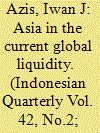

|
|
|
|
|
| Publication |
2014.
|
| Summary/Abstract |
In contrast with the pre~1997/98, today's emerging Asia registers excess savings. Since early 2000s, the liquidity was further boosted by in?ows of capital including those going through the banking sector. After a brief, yet sharp, interruption at the beginning of the global ?nancial crisis, in?ows resumed albeit of different form and inducted by different agents. Nonetheless, the global liquidity sphere has clearly changed. When the quantitative easing tantrum began in May last year, volatility returned. Largely due to a lack of innovative policy response, the episode of vacillating flows produced repercussions not different than in the past because the incentive system remains unchanged. Consequendy, vulnerability still rises with capital ?ows. The 'rational' response of agents is equally predictable, raising the risk of financial instability and exacerbating the already widening income disparity. Nothing is fundamentally new, everyone continues to "dance with the system."
|
|
|
|
|
|
|
|
|
|
|
|
|
|
|
|
| 3 |
ID:
096245


|
|
|
|
|
| Publication |
2010.
|
| Summary/Abstract |
The 2007-2008 global financial crisis encouraged speculation about the prospects for a 'Bretton Woods moment' in which the global financial system would be radically redesigned. Many of those hoping for this outcome have since become disillusioned with the limited nature of the international financial reform agenda. But the success and innovation of the Bretton Woods conference was made possible by unique political conditions that are not present today, notably concentrated power in the state system; a transnational expert consensus; and wartime conditions. Moreover, a close reading of history reveals that the Bretton Woods system did not emerge from a single moment but rather from a much more extended historical process. If a new international financial system is being born today, it will be a slower and more incremental development process that can be divided into four phases: a legitimacy crisis; an interregnum; a constitutive phase; and an implementation phase. Viewed from this perspective, post-crisis developments look more significant. The crisis of 2007-2008 has already intensified twin legitimacy crises relating to international financial policy and leadership. It has also generated an international reform initiative that has been unusual for its speed and internationally coordinated nature. Many of the details of this reform initiative remain unresolved and its content and breadth are hotly contested in various ways. We thus find ourselves in more of an interregnum than a constitutive phase. It remains unclear how quickly, if at all, the latter might emerge and in what form.
|
|
|
|
|
|
|
|
|
|
|
|
|
|
|
|
| 4 |
ID:
091998


|
|
|
|
|
| Publication |
2009.
|
| Summary/Abstract |
China's development has enormous implications for how the world is governed. The sheer size of the country means the effect of its activities inevitably spills over its borders. Beyond that, there is evidence that the Chinese government has taken an active role in a number of policy areas to defend China's expanding national interest and to strengthen its status in the world.As China's economy and its political ambition continue to grow, so will its influence around the world. In this article, we examine Chinese views and practices with regard to global governance. We also disuss the major factors that will shape the future of China's involvement in global governance.
|
|
|
|
|
|
|
|
|
|
|
|
|
|
|
|
| 5 |
ID:
086443
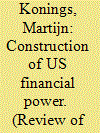

|
|
|
|
|
| Publication |
2009.
|
| Summary/Abstract |
Critical work in international political economy (IPE) has sought to theorise US financial power through the concept of structural power, intended as a means to go beyond state-centric conceptions of political power and to trace the state's interaction with socio-economic forces. But due to the tendency to ontologise the distinction between state and market, IPE has not been fully successful in articulating the linkages between structural power and state power. The article then examines literature in the field of cultural political economy (CPE), which emphasises the constitutive importance of the cultural norms and practices situated at the level of everyday life. The CPE literature fails to challenge established IPE accounts in some key respects, and the article relates this to its conception of political power. The article develops an institution-based perspective that is more suitable to theorising the linkages between structural power and state power, and then proceeds to develop an interpretation of the construction of American financial power over the course of the 20th century. It reinterprets some of the key moments in the history of US and global finance and re-examines notions of American financial decline.
|
|
|
|
|
|
|
|
|
|
|
|
|
|
|
|
| 6 |
ID:
178321
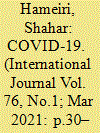

|
|
|
|
|
| Summary/Abstract |
Lockdowns and border closures to manage the ongoing COVID-19 pandemic have caused the greatest global economic shock since the Great Depression. Does this also signal the end of economic globalization, the most significant trend of the past forty years? And if so, what kind of global political economy is emerging from the wreckage? In this article, I argue that COVID-19 is mainly intensifying pre-existing trends, set in motion by the global financial crisis of 2008 and the People’s Republic of China (PRC)’s economic rise. The disruptions to global supply chains wrought by COVID-19 have combined with rising United States–PRC rivalry, growing disaffection with the distributional impacts of global value chains, and automation to catalyze the turn away from globalized production. Meanwhile, amid the economic doom and gloom, financial markets are booming, high on the central banks’ liquidity injections to which they have been addicted since the 2008 crisis. As in the decade since the 2008 crisis, booming markets will likely deepen inequality and resentment, fuelling economic nationalism and eroding support for globalization even more. The governments of relatively small and open economies, such as Australia and Canada, will need to guide their economies more purposefully or find themselves at the mercy of the increasingly confrontational, yet domestically fragile, United States and the PRC.
|
|
|
|
|
|
|
|
|
|
|
|
|
|
|
|
| 7 |
ID:
117489


|
|
|
|
|
| Publication |
2012.
|
| Summary/Abstract |
The Credit Crunch ushered in an era of austerity with massive cuts and job losses. It highlighted the gulf between the world of real people and the abstraction of high finance. Put simply, to prevent the melt-down of the global economy, the needs, hopes and ambitions of millions are being sacrificed. Who controls and issues money is key. To be viable any system must be big enough for people to have faith it won't fail, and it has to be administered soundly. Local government is accountable to its electorate and, as such, should put their welfare first. It is essentially an administrative machine and certainly isn't going to go away. A truly local economy could emerge with authorities initially paying part of their staff's wages in local currency and accepting it in payment of rates. At a stroke, job cuts could be reversed and people's skills and experience valued again.
|
|
|
|
|
|
|
|
|
|
|
|
|
|
|
|
| 8 |
ID:
095619
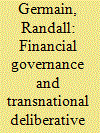

|
|
|
|
|
| Publication |
2010.
|
| Summary/Abstract |
Recent concern with the institutional underpinning of the international financial architecture has intersected with broader debates concerning the possibility of achieving an adequate deliberative context for decisions involving transnational economic governance. Scholars working within traditions associated with international political economy, deliberative democracy, cosmopolitanism and critical theory have informed this broader debate. This article uses this debate to ask whether the structure of financial governance at the global level exhibits the necessary conditions to support deliberative democracy. In particular, it considers the extent to which publicness and a public sphere have become part of the broader structure of financial governance. Although in some ways financial governance is a hard case for this debate, an argument can be made that a public sphere has emerged as an important element of the international financial architecture. At the same time, the analysis of the role of the public sphere in financial governance reveals important lessons which public sphere theorists and deliberative democracy advocates need to consider in order to extend their analysis into the realm of global political economy.
|
|
|
|
|
|
|
|
|
|
|
|
|
|
|
|
| 9 |
ID:
054947


|
|
|
| 10 |
ID:
092084


|
|
|
|
|
| Publication |
2009.
|
| Summary/Abstract |
This article explains a shift in the way transatlantic authorities managed conflicts over the cross-border regulation of securities markets: from cooperation skewed heavily toward the preferences of U.S. officials and accepted grudgingly by European counterparts; to a Euro-American regulatory condominium characterized by close interactions among decision makers and mutual accommodation. In the final decades of the twentieth century, the asymmetric influence wielded by U.S. securities market authorities had few parallels in other regulatory areas. Why, then, did U.S. officials become more accommodating and European authorities more influential, and why did the turning point occur in 2002 and 2003, an unlikely moment for intensified transatlantic sovereignty sharing? My study shows that institutional change inside the EU recast the North Atlantic balance of regulatory leverage and thereby was the primary factor behind the reshaping of transatlantic cooperation. Internal EU regulatory centralization changed the expectations of U.S. and European firms and authorities and generated new incentives in Washington, D.C., for accommodation and closer transatlantic coordination. My explanation differs from models that, accepting U.S. financial pre-eminence as a given, attribute variance in cross-border regulatory cooperation to factors such as incentives derived from the particularities of issue areas or preferences rooted in domestic politics. While resonating with a well-established theme from the realist branch of IPE, my findings have broad theoretical significance, and open new avenues for dialogue between realists and constructivists about the social, political, and institutional foundations of power in global economic affairs. The transatlantic political process set off by financial transformation in Europe reveals contemporary sources of systemic change and raises questions about what the EU's ascendance as a global financial regulator will mean in the aftermath of the late-2000s crisis.
|
|
|
|
|
|
|
|
|
|
|
|
|
|
|
|
| 11 |
ID:
097020
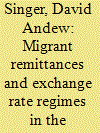

|
|
|
|
|
| Publication |
2010.
|
| Summary/Abstract |
This article argues that the international financial consequences of immigration exert a substantial influence on the choice of exchange rate regimes in the developing world. Over the past two decades, migrant remittances have emerged as a significant source of external finance for developing countries, often exceeding conventional sources of capital such as foreign direct investment and bank lending. Remittances are unlike nearly all other capital flows in that they are stable and move countercyclically relative to the recipient country's economy. As a result, they mitigate the costs of forgone domestic monetary policy autonomy and also serve as an international risk-sharing mechanism for developing countries. The observable implication of these arguments is that remittances increase the likelihood that policy makers adopt fixed exchange rates. An analysis of data on de facto exchange rate regimes and a newly available data set on remittances for up to 74 developing countries from 1982 to 2006 provides strong support for these arguments. The results are robust to instrumental variable analysis and the inclusion of multiple economic and political variables.
|
|
|
|
|
|
|
|
|
|
|
|
|
|
|
|
| 12 |
ID:
085706


|
|
|
| 13 |
ID:
171247
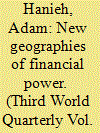

|
|
|
|
|
| Summary/Abstract |
A growing body of critical scholarship has examined the recent growth of Islamic finance (IF), unpacking its ethical assertions and highlighting its close affinities with conventional financial instruments. Receiving less attention, however, is the relationship between the global expansion of IF and the emergence of new financial actors and zones of accumulation. This article situates the evolution of global Islamic circuits alongside processes of capital accumulation in the Gulf Cooperation Council (GCC), arguing that contemporary IF is deeply bound up with the internationalisation of capital groups headquartered in the GCC. This is evident in the internationalisation of GCC Islamic banks, which has given the Gulf a powerful foothold in new markets and a variety of sectors that are typically considered ‘non-financial’. Simultaneously, the expansion and geographical diversification of Islamic debt (sukuk) issuance is refashioning the Gulf’s relationships with other global spaces, a process that looks set to intensify given the widespread push to utilise IF in development financing. Seen from this perspective, the global growth of IF sits in a mutually constitutive relationship with patterns of capital accumulation in the Gulf, as well as the region’s burgeoning weight within (and new linkages to) the global economy.
|
|
|
|
|
|
|
|
|
|
|
|
|
|
|
|
| 14 |
ID:
118026
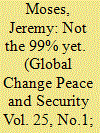

|
|
|
|
|
| Publication |
2013.
|
| Summary/Abstract |
In September of 2000, I took part in the 'S11' protests in Melbourne during the World Economic Forum (WEF). Following in the wake of the 'Battle in Seattle' protests the preceding year, S11 was understood as a continuation of the push by 'the people' against the anonymous and destructive forces of global finance, underpinned by principles of neo-liberal globalization. I recall with particular clarity the events of one night during the WEF when, heading back to our motel after a long day of festivities and confrontations, we saw a rush of people toward one of the entries to the Crown Casino. It soon became apparent that some forum participants were either coming or going at this time and this became one of many flashpoints for conflict between protestors and police. Taking my place face to face with riot police and the horses on which some of them were mounted, the situation quickly intensified. There was a certain buzz to be had from facing off with police in this way; coming face to face with the visible face of sovereignty and screaming abuse at it. It was a moment in which we thought we knew what it was like to see through the mask of liberal democracy and experience the reality of a police state.
|
|
|
|
|
|
|
|
|
|
|
|
|
|
|
|
| 15 |
ID:
151645
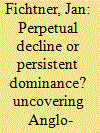

|
|
|
|
|
| Summary/Abstract |
The prediction of America’s decline is a regularly recurring phenomenon; this also pertains to the pivotal field of global finance. This article argues that, first we have to consider the United States together with the other Anglophone countries. The English-speaking countries and territories – Anglo-America – have deep common political and socioeconomic roots, of which the unique global Five Eyes intelligence cooperation is merely one manifestation. In finance, New York and London (NY-LON) constitute the decision-making core of this transnational formation. Second, to analyse the highly complex phenomenon of structural power in the globalised international political economy we have to dig deeper to uncover truly meaningful data. Thus, this article evaluates data for nine central segments of global finance from around the year 2000 to 2014. Contrary to the assertions of many declinists, these data show that Anglo-America’s dominant structural power has been persistent during this period. Moreover, four novel visualisations show that the US-UK axis is the fulcrum of the international financial system. However, contemporary global finance is characterised by a high degree of latent fragility; significant imbalances, inequalities and contradictions persist and are even likely to grow, potentially undermining the legitimacy and the stability of the whole system.
|
|
|
|
|
|
|
|
|
|
|
|
|
|
|
|
| 16 |
ID:
121594


|
|
|
|
|
| Publication |
2013.
|
| Summary/Abstract |
Although the subprime crisis regenerated interest in and stimulated debate about how to study the politics of global finance, it has not sparked the development of new approaches to International Political Economy (IPE), which remains firmly rooted in actor-centered models. We develop an alternative network-based approach that shifts the analytical focus to the relations between actors. We first depict the contemporary global financial system as a network, with a particular focus on its hierarchical structure. We then explore key characteristics of this global financial network, including how the hierarchic network structure shapes the dynamics of financial contagion and the source and persistence of power. Throughout, we strive to relate existing research to our network approach in order to highlight exactly where this approach accommodates, where it extends, and where it challenges existing knowledge generated by actor-centered models. We conclude by suggesting that a network approach enables us to construct a systemic IPE that is theoretically and empirically pluralist.
|
|
|
|
|
|
|
|
|
|
|
|
|
|
|
|
| 17 |
ID:
147961
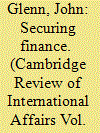

|
|
|
|
|
| Summary/Abstract |
This paper examines the changes that have been made to the global financial architecture in the aftermath of the financial crisis and argues that the reforms are confronted with a paradox. Intervention is required to ensure the smooth running of the economy, yet too heavy a hand risks disrupting a central circuit of capital. We have recently witnessed a tightening of the regulatory mechanism such that the parameters of risk taking have been reduced—financial activity now modulates within a more risk adverse environment. Yet, the reforms are not as radical as they could have been, reflecting the need to ensure effective and efficient circulation within an increasingly important area of the economy. However, a stronger emphasis on pre-emptive surveillance has emerged, which may partly compensate for the lack of radical reforms in other areas.
|
|
|
|
|
|
|
|
|
|
|
|
|
|
|
|
| 18 |
ID:
139585
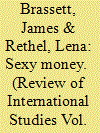

|
|
|
|
|
| Summary/Abstract |
The article develops a critical analysis of gendered narratives of global finance. The post-subprime crisis equation of unfettered global finance with the excessive masculinity of individual bankers is read in line with a wider gender narrative. We discuss how hetero-normative relations between men and women underpin financial representations through three historical examples: war bond advertising, Hollywood films about bankers, and contemporary aesthetic representations of female politicians who advocate for austerity. A politics emerges whereby gender is used to encompass a/the spectrum between embedded and disembedded finance, approximate to the divide between oikonomia and chrematistics. The apparently desirable ‘marriage’ between the state and finance that ensues carries several ambiguities – precisely along gender lines – that point to a pervasive limit: the myth of embedded liberalism in the imagination of global finance.
|
|
|
|
|
|
|
|
|
|
|
|
|
|
|
|
| 19 |
ID:
117039


|
|
|
|
|
| Publication |
2012.
|
| Summary/Abstract |
The current economic crisis challenges the constitutive rules of global finance. Despite its various roots, dynamics, and consequences, the current reform debate is surprisingly limited in scope: it focuses on possible changes of Basle II and thus banking regulation only. This article suggests that the reason for this 'gap' can be found in the idea of asymmetric information. The idea that the asymmetric dispersion of information is the 'real' cause of the crisis is reiterated constantly in public documents. However, the argument rests upon two assumptions: that crises are exogenous to otherwise efficient and stable markets, and that finance is an autonomous field where the primary focus of the current reform can then concentrate on its laws. It is thought that it is enough to reform financial markets to stabilise the global economy. This article suggests that this belief is utterly misguided and argues that a more comprehensive picture of the current turmoil needs to abandon exactly these two assumptions. To pursue such an avenue, this article provids an interpretation of Hayek's social theory.
|
|
|
|
|
|
|
|
|
|
|
|
|
|
|
|
| 20 |
ID:
131599
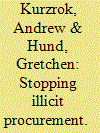

|
|
|
|
|
| Publication |
2014.
|
| Summary/Abstract |
A Hollywood, Florida, conference of specialists in preventing, detecting, and responding to money laundering might not seem to be the most likely spot for the next innovation in nuclear nonproliferation policymaking. Yet, a March speech by Jennifer Shasky Calvery, director of the Department of the Treasury's Financial Crimes Enforcement Network (FinCEN), suggested an approach that regulators charged with stopping the proliferation of nuclear weapons would do well to study. Shasky Calvery stated that "FinCEN needs to find ways for more dynamic, real-time information sharing, both by and between financial institutions, and with FinCEN and law enforcement."[1] The information to which she was referring is transaction data related to money laundering that currently reside within banks, casinos, credit card processing companies, and many other types of financial businesses. Export control regulators could apply Shasky Calvery's approach to their own mission. In the nonproliferation context, FinCEN's anti-money laundering data would be analogous to the inquiries that potential buyers of dual-use commodities place over the phone or on commercial websites. Dual-use commodities have legitimate civilian applications, but can also be used to support nuclear weapons development. If a request appears suspicious, most firms will decline the request. Unlike their counterparts in the financial sector, however, export control regulators and private business have few tools with which to gather and disseminate this critical information about the networks illicitly seeking strategic commodities. Taking a page from the anti-money laundering playbook may help stop proliferation procurement.
|
|
|
|
|
|
|
|
|
|
|
|
|
|
|
|
|
|
|
|
|